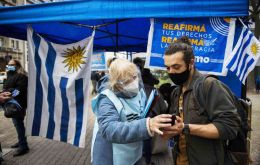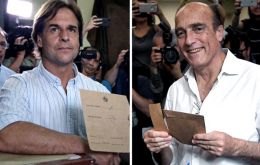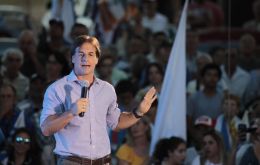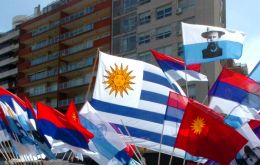MercoPress. South Atlantic News Agency
Tag: Frente Amplio
-
Tuesday, September 14th 2021 - 09:23 UTC
Uruguay's Congress hit by coronavirus infections

A few Uruguayan lawmakers tested positive for SARS-Cov-2 forcing 48 people from the national Congress to go into isolation, it was reported Monday.
-
Thursday, July 8th 2021 - 09:55 UTC
Uruguay's opposition files for referendum against emergency law

Uruguayan opposition politicians are ready to submit a petition for the partial repeal of the government's Urgent Consideration Law (LUC).
-
Wednesday, July 7th 2021 - 09:21 UTC
Chile's Constitutional Convention hopes to gets started this Wednesday after numerous technical issues

Chile's Constitutional Assembly is finally set to start its historic sessions Wednesday at 10 am local time in Santiago, following last-minute problems earlier this week.
-
Monday, December 7th 2020 - 09:05 UTC
Uruguay's twice president Tabare Vazquez dies: kilometers of vehicles followed the funeral procession

Two times former Uruguayan President Tabaré Vázquez died early morning Sunday in Montevideo at the age of 80 after suffering from lung cancer and pancreatic metastasis. By early afternoon and following on the family's wishes Vazquez was buried in a private ceremony at the La Teja cemetery, the working neighborhood where he grew up.
-
Monday, November 25th 2019 - 09:59 UTC
Uruguay's presidential runoff results delayed because of the very tight results

Uruguay Sunday's presidential runoff results have been so tight that the Electoral Court will only make a definitive announcement sometime late this week after it has completed counting all votes, including some 34.000, classified as “observed”. This is because the difference between the two candidates is some 29.000 votes.
-
Saturday, November 23rd 2019 - 09:59 UTC
Uruguay Sunday's presidential runoff, a multicolor power switching with strong winds of change

This Sunday 2.7 million Uruguayans will cast their ballots in the presidential runoff, which according to all opinion poll forecasts, will have Luis Lacalle Pou, the leader of an opposition multicolor alliance as head of the Executive next March, but equally significant, power switching, it will mark the end of fifteen years of almost undisputed predominance of a catch-all coalition, Broad Front, which ruled South America's smallest country for three consecutive five-year mandates.
-
Tuesday, November 19th 2019 - 23:41 UTC
Uruguay presidential elections: Lacalle Pou would widely win, according to polls

After a long election campaign, Uruguayans live the last days before the second round of the presidential elections, which will take place on Sunday, November 24. The latest polls before the ballotage positions the nationalist Luis Lacalle Pou as the next president of the country, breaking the hegemony of the left that the Frente Amplio (Broad Front) imposed in the last 15 years.
-
Saturday, November 16th 2019 - 09:41 UTC
Uruguay election runoff: “Game over, I'm the boss”, Mujica tells the incumbent candidate

Next 24 November Uruguayans will cast their runoff ballot to elect the next president, scheduled to take office in March 2020. The dispute is between the two winners of the first round on 27 October, the candidate from the ruling coalition that has enjoyed fifteen years in office, and the leader of the opposition who has managed to conform a working “multicolor” majority in the next Legislative, and is ahead in opinion polls tendencies.
-
Thursday, November 14th 2019 - 09:57 UTC
Uruguay presidential debate focused on economy and security ahead of the ballotage on November 24

In a tense debate a week and little of the second round of the presidential election in Uruguay, on Wednesday night the candidates offered profound differences both in terms of economy, public security and the country's positioning in foreign policy mentioning the dictatorship of Venezuela.
-
Wednesday, October 23rd 2019 - 21:54 UTC
Uruguay Sunday’s general election: To a second ballotage and without parliamentary majority

On Sunday, October 27, in Uruguay, a new president, and Parliament will be elected. According to pollsters, the same parties as in 2014, the official Frente Amplio (FA, Broad Front) and the conservative National Party, will go on second ballotage in November. However, the novelty is that the Legislature will be made up of a minimum of six parties (a historical record) and a maximum of nine.
